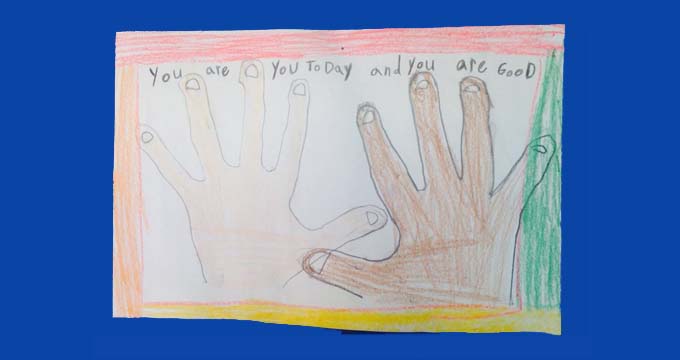This is the second in a series of blog posts focused on the value of art in our lives, and the role art can play in resisting the test and punish model of education. See the intro and links to other posts in the series here.
By Michelle Gunderson.
My first grade class was sitting in front of me gathered at our reading rug, and I asked them, “Could you write a poem about something important?” One of my students said, “Heck, yeah.” And off they went, paper in hand, to their tables – each child hunched over their paper scratching away words that were coming straight from the heart.
I did not teach the most extraordinary poetry unit. It was fairly simple, in fact. We read tons of poems, made lists of what we noticed, tried different techniques, and learned the mechanics of poetry. But at the end of the unit we read Whitman, Hughes, Dickinson, and Rosetti. We decided to add to our list of poetry features that poems can be about something important.
Writing a poem when you are six, and experiencing yourself as a poet is extraordinary.
Poetry is the natural language of childhood – we hear it in nursery rhymes, playground games, and jump rope songs. Yet, writing poetry is not part of the Common Core standards in the early grades. There are several reasons to be troubled by this. First of all, when we eliminate a genre of literature that is natural to children, we also restrict the love of language necessary to draw young readers into the process. I have contended in other writings and presentations that the Common Core standards do not take into consideration child development and natural inclinations of young children. This is yet another example.
It becomes more troubling when we recognize that poetry and song are the elements of resistance and movements. These are the ways that people fully express who they are and speak out against oppression. And finally, poetry is an art, and it is part of being fully human.
That is why I titled my presentation for the Teachers for Social Justice Curriculum Fair this past weekend in Chicago, “Poetry as Subversive Activity.”
During the curriculum fair I tweeted responses to my poetry presentation. Many of the pre-service teachers I spoke to were surprised to learn that there are no poetry writing standards in the Common Core. After I tweeted this, one internet troll who monitors my Twitter account responded, “HaHaHaHaHa – there are no piano standards either.”
Think about this pompous, elitist, and callous response. I am fairly certain in the schools he and his children experience students and teachers are given freedom to explore the arts in ways that enrich lives. The authors and promoters of the Common Core would argue that everything that should be taught is not contained in the standards, but we know in many schools the dogma prevails – what is tested is what is taught.
Let us put ourselves in the shoes of Chicago teachers (and many around the country) who experience a draconian environment where “measure to manage” is almost a religious mantra. We have network chiefs and administrators who insist that every single lesson and unit plan be aligned to the Common Core. We fill out time allotment schedules where each minute must be accounted for in instruction geared towards testing. And when we stray from these plans there are many schools where teachers face reprimand.
This is when teaching poetry becomes an act of resistance. It is a defiance of the testing regime that seeks to punish, sort, and divide our students. And it is a reclaiming of our profession.
Here are three of the poems my first grade students wrote:
Presidents by Christopher
Presidents of the USA airforce
Keep no danger
Keep goodness
Do not use guns, or stuff like that
Use words
Will might stop it
Workers by Charlotte
Work workers
You work hard
If there was no
People that worked
We would not live
Freedom for Everyone by Arinav
Free! Free! Free!
Everyone likes being free
Outside in the grass
Inside with your toys
Freedom is on the flag
Freedom is on a leaf
Freedom
Is
Everywhere
I have also written a poem for one of my students who experienced pre-school and kindergarten in a Waldorf program. The ins and outs of public school seem like a foreign landscape to her (rightfully so), and I constantly find myself hugging her and saying, “It will be alright, little one.”
Furrows by Mrs. Gunderson
I see the furrowed brow
So much worry
Letters and sounds into words
So hard
But we will plant seeds
In those furrows, little one
And watch them grow
Teaching poetry and the arts in our classroom, not only nourishes our students, it nourishes us as educators. I refuse to live in hollow space that does not honor me or the little ones I care for as poets.
Michelle Strater Gunderson is a 29 year teaching veteran who teaches first grade in the Chicago Public Schools. She is a doctoral student at Loyola University in Curriculum and Instruction.






Leave a Reply